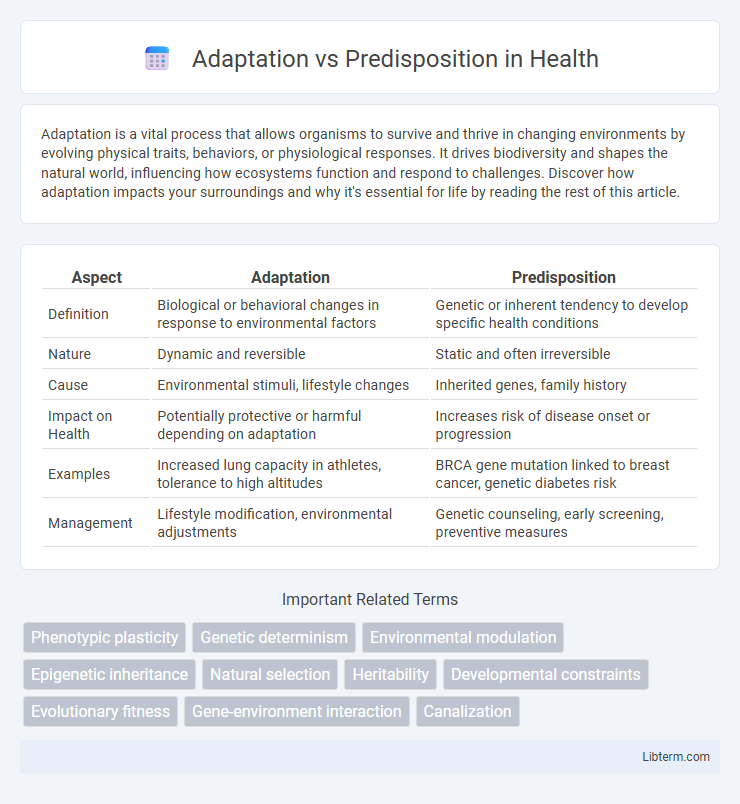Adaptation is a vital process that allows organisms to survive and thrive in changing environments by evolving physical traits, behaviors, or physiological responses. It drives biodiversity and shapes the natural world, influencing how ecosystems function and respond to challenges. Discover how adaptation impacts your surroundings and why it's essential for life by reading the rest of this article.
Table of Comparison
| Aspect | Adaptation | Predisposition |
|---|---|---|
| Definition | Biological or behavioral changes in response to environmental factors | Genetic or inherent tendency to develop specific health conditions |
| Nature | Dynamic and reversible | Static and often irreversible |
| Cause | Environmental stimuli, lifestyle changes | Inherited genes, family history |
| Impact on Health | Potentially protective or harmful depending on adaptation | Increases risk of disease onset or progression |
| Examples | Increased lung capacity in athletes, tolerance to high altitudes | BRCA gene mutation linked to breast cancer, genetic diabetes risk |
| Management | Lifestyle modification, environmental adjustments | Genetic counseling, early screening, preventive measures |
Understanding Adaptation and Predisposition
Understanding adaptation involves recognizing how organisms adjust their behaviors or physiology in response to environmental changes, enhancing survival over time. Predisposition refers to the genetic or inherent tendencies that influence an individual's likelihood of exhibiting certain traits or developing specific conditions. Differentiating adaptation from predisposition is crucial for research in evolutionary biology, genetics, and personalized medicine.
Defining Key Concepts: Adaptation Explained
Adaptation refers to the dynamic process through which organisms adjust their behaviors, physiology, or structures in response to environmental changes, enhancing survival and reproduction. It involves genetic modifications across generations or phenotypic plasticity within an individual's lifetime. This concept contrasts with predisposition, which denotes inherent genetic or biological tendencies influencing an organism's likelihood to exhibit certain traits or conditions.
What Is Predisposition? A Closer Look
Predisposition refers to an inherent tendency or susceptibility to develop certain traits, conditions, or behaviors based on genetic, environmental, or psychological factors. Unlike adaptation, which involves changes in response to external stimuli, predisposition exists prior to any exposure and influences an individual's likelihood of future outcomes. Understanding predisposition helps identify risks and tailor prevention strategies in fields such as medicine, psychology, and genetics.
Biological Foundations: Genes vs. Environment
Biological foundations highlight the complex interplay between adaptation and predisposition through genes and environment, where genes provide a blueprint for potential traits while environmental factors influence the expression and development of these traits. Genetic predisposition involves inherited variations in DNA that can increase susceptibility to certain conditions, whereas adaptation describes the process by which organisms adjust to environmental pressures, often through epigenetic modifications that alter gene expression without changing the DNA sequence. Research in molecular biology and epigenetics demonstrates how environmental stimuli such as nutrition, stress, and toxins can modulate the activation of genes, leading to phenotypic changes that reflect both inherited predispositions and adaptive responses.
Examples of Adaptation in Nature
Adaptation in nature includes the development of camouflage in chameleons, enabling them to blend into their environment and evade predators, enhancing survival. Another example is the thick fur of polar bears, which insulates them against extreme Arctic temperatures, ensuring their ability to thrive in cold climates. Similarly, cactus plants exhibit water storage adaptation, allowing them to survive prolonged droughts in desert ecosystems.
Predisposition in Human Behavior
Predisposition in human behavior refers to genetically or biologically influenced tendencies that shape an individual's reactions and decision-making patterns before environmental factors intervene. Research in behavioral genetics highlights that certain traits, such as temperament, risk tolerance, and susceptibility to mental health disorders, often have hereditary components that predispose individuals to specific behaviors. Understanding predisposition aids in distinguishing innate behavioral potentials from adaptive responses, facilitating targeted interventions in psychology and personalized medicine.
Interplay Between Adaptation and Predisposition
The interplay between adaptation and predisposition shapes individual responses to environmental stimuli, where genetic predisposition influences baseline traits while adaptation drives dynamic changes through experience. Neural plasticity mechanisms exemplify this interaction, enabling adaptive behaviors that modify inherent predispositions in response to external challenges. Understanding this balance is crucial for personalized medicine, as it informs strategies that leverage genetic insights alongside environmental modifications to optimize health outcomes.
Evolutionary Perspectives: Survival and Selection
Adaptation involves genetic changes that enhance an organism's survival and reproductive success within a specific environment, shaped by natural selection over generations. Predisposition refers to inherited traits or genetic tendencies that influence an organism's potential response to environmental pressures but do not guarantee specific adaptations. From an evolutionary perspective, survival depends on both the presence of beneficial predispositions and the capacity for adaptive modifications that are favored by selective forces acting on populations.
Implications in Health and Disease
Adaptation and predisposition significantly impact health and disease outcomes, as adaptation involves the body's dynamic response to environmental stressors enhancing resilience, whereas predisposition indicates genetic or epigenetic vulnerabilities increasing disease risk. Understanding gene-environment interactions and epigenetic modifications provides insight into personalized prevention strategies and targeted therapies. This knowledge advances precision medicine by identifying individuals at higher risk and optimizing interventions to improve prognosis and reduce healthcare costs.
Adaptation vs. Predisposition: Key Takeaways
Adaptation involves the dynamic biological and behavioral responses organisms develop to survive in changing environments, whereas predisposition refers to inherent genetic or psychological traits that influence susceptibility to certain conditions. Understanding the balance between adaptive mechanisms and inherited predispositions is crucial for developing personalized medical treatments and preventive strategies. Research highlights that adaptive capacity can mitigate risks associated with predispositions, emphasizing the importance of environmental and lifestyle factors in health outcomes.
Adaptation Infographic

 libterm.com
libterm.com